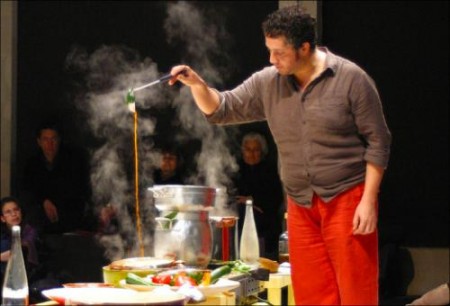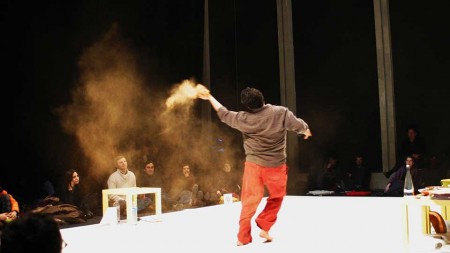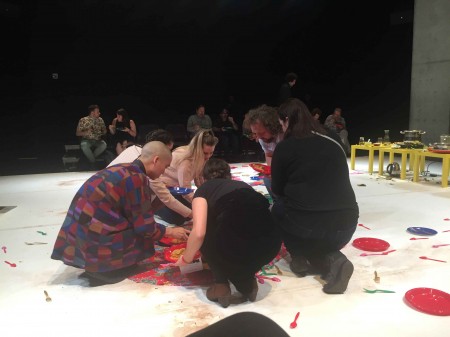I’m perched on the kitchen counter, watching my mother cook. It’s dark outside, the company will arrive soon and the air is weighted with smell. The scene is hazy with steam that floats past and is illuminated by our kitchen lights. Sweeping and sashaying across the wooden floor, my mother’s movements are made of mystery to me. Her favorite cd plays in the living room. She doesn’t follow a recipe. She’s made this this dish so many times it’s choreographed within her.
Radhouane El Meddeb brought me back to this scene with his performance Je danse et je vous en donne à bouffer (I Dance and I Feed You). Suddenly I am that kid again, waiting in the wings for a way to help, but mostly content breathing in the energy. Fluid movements and intuitive decisions- I want to understand what’s happening but know I cannot ask and disturb the ritual which is unfolding before me.
Walking into the black box theater at The Contemporary Arts Center, the stage is white and clean. The audience sits in the round. Short yellow tables on one side of the stage reveal to the audience a bounty of vegetables and spices. A large couscous pot sits upon a hot plate next to pitchers of oil and water. A feast is laid out for us on the altar of this stage. Opposite sits a laptop, more tables and El Meddeb -still, silent, and waiting. El Meddeb will prepare a meal for us. A meal his Tunisian family has served for generations at every major event from births and weddings to funerals. Wordlessly, El Meddeb sets the tone by selecting a track on his computer. He cranks the volume. He begins to move and cook. The music is loud, energetic and encompassing. The next hour and a half flies by as I am enamored by his ability to tell us a very specific story about his family and culture, while reminding me constantly of my own experiences in the kitchen with family, learning about food and life.
El Meddeb performs a ritual for us, a melding of history, family, religion and culture. He dances and leaps across the stage, stopping sometimes to change the song, between tossing onions into the pot and scattering cinnamon on top. He will stop to sneak a bite of carrot or relish in the richness of the cinnamon. I can see each movement holds its own history. These movements are from a muscle memory- something he has seen a thousand times before. Something that somehow makes the food taste better. So much of the movement he makes seems to be built into his body – as if there is no and never will be another way to sprinkle salt or pour oil.

El Meddeb embodies a matriarchal role, running his kitchen and keeping things in check. He does not speak during the performance but there is a consistent dialogue between himself and the audience which is central to the experience. We are the kids watching our mothers and aunts cook in the kitchen. He knows we are there, but it is understood that we are not to disturb. Individuals are reminded of their place when caught speaking out of turn- receiving sharp, piercing glances from El Meddeb. He stares until they meet his gaze, holding eye contact longer then they are comfortable with. He flirts with the audience, first sharply calling out those who whisper to one another, later rewarding them with small tokens of forgiveness – a piece of carrot, a zucchini. El Meddeb still loves you, but DON’T do it again. He plays favorites in his kitchen, giving some more than their share and others nothing at all.
At times, he shifts into a more playful role, alone in the center of the stage, lost in a movement as the pot boils over behind him. I see a person dancing alone in their kitchen, tasting, laughing, and passing in and out of awareness of their surroundings. He is both his mother and aunts, preparing for a wedding but also himself, alone, cooking this dish to remind himself of those memories. Smell is the sense most closely associated with memory. I can only imagine that each performance is a trip through his past.
Smell plays an ever increasing role in the performance. It becomes overwhelming. My mouth waters with the anticipation of my dinner but the audience has to wait until the ritual is over. Each new addition to the pot adds to its richness and before our eyes and noses a harmony of smells begin to form, wafting throughout the room until we are all swimming in it. El Meddeb will use his body to share it with us. He spreads his arms and runs in circles around the stage with increasing speed, making himself a fan. As he runs, waves of spices hit us in the face. He wants to share these scared smells with us.

The once pristine stage becomes chaotic. The tables are scattered with spices and spills. El Meddeb’s movements paint pictures on the floor made of smell and color as he leaves a trail of cinnamon in his wake. The food is almost ready. El Meddeb begins to hand out our plates. He again plays favorites, carefully choosing who will get the first helping but eventually deciding that he should eat first. After finishing a serving, El Meddeb becomes frantic as he distributes the plates and table ware. Eventually the stage is scattered with colorful plastic plates and cutlery. He tip toes between forks to lay the final dish down in the center of the stage – the altar place of this performance. Without warning he runs off stage and the performance ends. After an elongated silence, the first brave audience member selects a plate from the floor and serves themselves.

Je danse et je vous en donne à bouffer (I Dance and I Feed You) was an unexpectedly personal experience. I found myself provoked by this simple concept. Food plays such a central role in the ceremonies of all cultures and that universality makes this performance all the more fascinating. The dish, so specific to the artist’s home and family, was the vehicle for a very human experience that spans cultures. The spices, colors and music created a landscape to deliver El Meddeb’s personal message of veneration for his Tunisian experience while letting the audience of outsiders relate to its essences.
El Meddeb’s choice to prepare and share food with his audience speaks to a bond between humans that has been building longer then language. It’s an act that in many ways sets us apart from other animals. This gesture is a universal sign of welcome which can bridge the most drastic differences between us. El Meddeb is giving us a slice of his world. He’s letting us watch through the window as his mother prepares couscous and he sits on the counter top and watches. He’s holding out his hand so we can step into his memories. El Meddeb accomplishes the lofty tasks of making the universal specific, and the specific universal through food and dance – two art forms we all share.
-Chelsea Borgman is an artist and writer working in Cincinnati Ohio. She is the gallery director of C-LINK Gallery at Brazee Street Studios